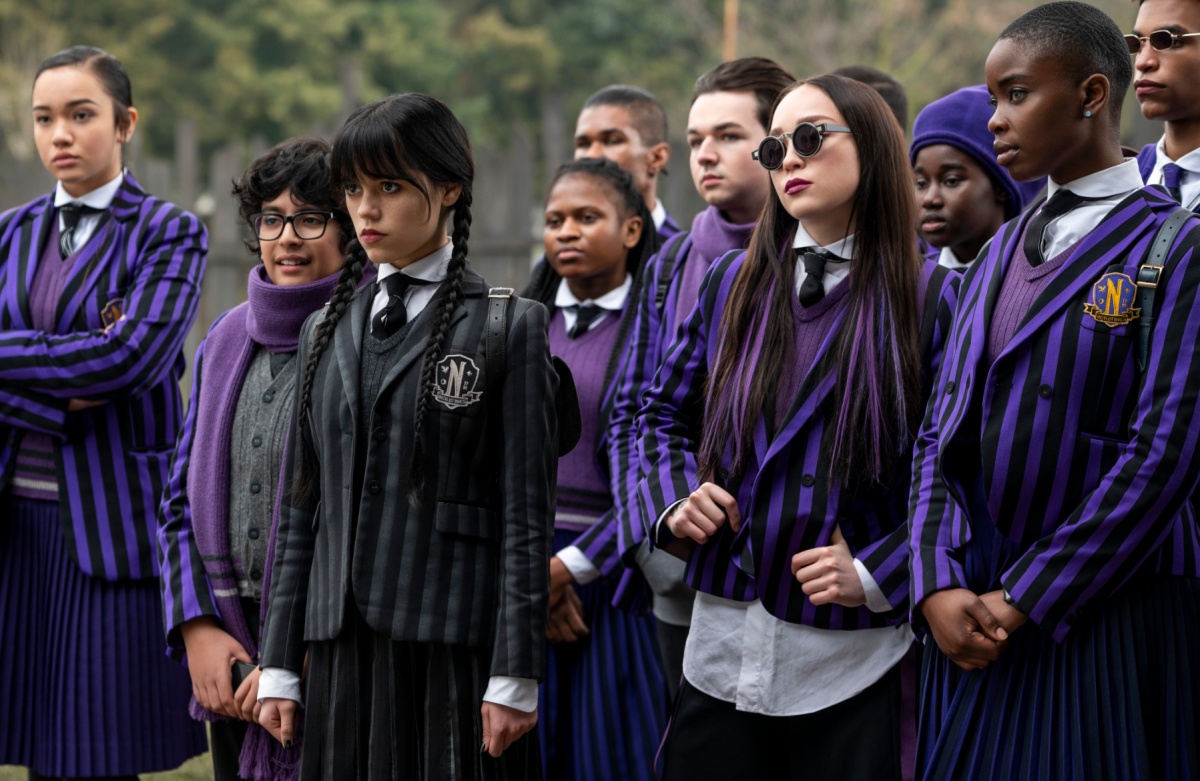Netflix’s ‘Wednesday’ Is Receiving Backlash for This Casting Choice

Wednesday has taken Netflix by storm since its pre-Thanksgiving release on November 23. The series is the first live-action adaptation of the Addams family in 24 years, and the first project to largely focus solely on Wednesday Addams (Jenna Ortega). So far, the show has received largely positive reviews from critics, nearly all of whom have especially singled out Ortega’s performance for praise. Ortega is the first Latina to portray Wednesday and she quickly won audiences over with the depth she gave the character, as well as her hilarious deadpan and goth spirit.
In addition to positive reviews, Wednesday has been raking in quite impressive viewership numbers. It broke the record for the most watched TV show on Netflix in a single week: In one week, Wednesday was watched for a total of 341.2 million hours, beating the previous record holder, Stranger Things, in a landslide. While Wednesday has lots to celebrate, one criticism is overshadowing the series a bit. Here’s everything you need to know about the Wednesday backlash.
Why are Wednesday and Tim Burton receiving backlash?
Shortly after Wednesday‘s release, social media users and some critics began accusing the series and executive producer Tim Burton (who also directed four episodes) of racism. The reason for this was the series’ questionable choice to cast the few Black actors in the show as villains or bullies. This trend held for all three of the show’s main or recurring Black actors—Joy Sunday, Iman Marson, and Tommie Earl Jenkins. Jenkins and Marson play father and son duo Noble and Lucas Walker, respectively, while Sunday plays Bianca, a student at Nevermore.
Viewers learn early on that these characters are antagonists. Bianca is the resident mean girl at Nevermore and quickly becomes Wednesday’s bully and nemesis. Additionally, it is revealed that Bianca uses her siren abilities to manipulate and coerce others, which is how she tricked her way into Nevermore. Desperate to keep her actions secret, she agrees to help her mother’s cultish “Morning Star” group, which uses manipulation to swindle their clients under the guise of teaching them self-help.
Lucas, a local from the town of Jericho, is also a major bully who disrupts the Nevermore dance with a cruel prank. Meanwhile, his father Noble is the shady mayor of Jericho who memorializes the town’s genocidal forefathers and covers up crimes to save face.
What’s even more absurd is that Lucas and Noble own a theme park and museum dedicated to the memory of pilgrims and colonizers. Anti-racism consultant Jon Cornejo pointed out how ridiculous and nonsensical it was to have a Black mayor praising genocidal colonizers and pilgrims. It also demonstrates how series creators Alfred Gough and Miles Millar wrote the characters as if they were white, but then placed Black actors in the roles with no thought as to how their race might have impacted their beliefs and values.
Is Wednesday racist?
These allegations have sparked debate online as to whether Wednesday is actually racist. After all, having a Black actor portray a villain is not in itself racist. In addition to this, both Bianca and Lucas experience growth throughout the show. Bianca is an especially complex character who has many more layers to her than “bully.” However, given Burton’s history of racism, it certainly raises the question of whether the casting choices were coincidental or not.
Burton is known for rarely casting Black actors in his works. Miss Peregrine’s Home for Peculiar Children and The Nightmare Before Christmas, for example, each featured just one Black actor. Samuel L. Jackson portrayed the antagonist in the former and Ken Page portrayed a villain named “Oogie Boogie” in the latter. When Burton was questioned about the lack of diversity in his films, he made the excuse that minorities just weren’t “called for” in his work:
That’s an unfortunate pivot for a filmmaker who cast Billy Dee Williams as Harvey Dent/Two-Face in Batman (he initially planned to make Williams’ Dent a major villain in Batman Returns), and cast Marlon Wayans as Robin in Batman Returns before Warner Bros. nixed both.
Ultimately, the answer as to whether Wednesday is racist is largely left up to interpretation. However, it is quite clear that Burton has made racist remarks in the past and rarely includes Black characters in his movies. With that in mind, the alleged racism in Wednesday isn’t something that should be dismissed too quickly.
(featured image: Netflix)
Have a tip we should know? tips@themarysue.com